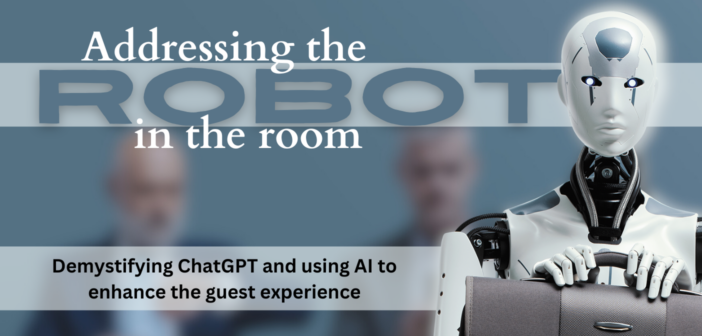Demystifying ChatGPT and using AI to enhance the guest experience
Artificial intelligence has been a plot device in science fiction for more than 100 years. Through the lens of science fiction, we’ve explored many versions of what AI could mean for society as a whole. As with most science fiction, AI has been a concept or fancy that would be available far into the future. But in November 2022, OpenAI released ChatGPT, which put AI into the hands of millions worldwide. For many of us, AI went from something in the distant future to the “here and now” overnight.
OpenAI developed ChatGPT as a language model designed to generate human-like responses to user input. The model has been trained on a large and diverse dataset that includes text from websites and books, though the specifics aren’t publicly disclosed. ChatGPT generates responses by calculating the statistical likelihood of one token of text following another based on its training data. While this probabilistic approach means you could get different answers for the same question due to inherent randomness in the generation process, it’s not a guarantee. Another way to understand ChatGPT is as an advanced statistical model that “completes” your prompts in a way that’s consistent with the patterns in the data it was trained on.
THE NEW REALITY
For those of us in travel and tourism, the guest experience is a critical factor that can determine our success. It encompasses all interactions and experiences a traveler has from the moment they start planning a trip to when they return home. The better the guest experience, the more likely travelers are to recommend the service to others, leave positive reviews, and become repeat customers.
It’s not a question of if ChatGPT will be used to enhance the guest experience. It’s a question of when and to what extent?
The planning and booking phase is widely regarded as the first stage of the guest experience. For the traveler, it’s all about information gathering, planning, and eventually booking. Expedia and Kayak quickly developed plugins for ChatGPT and announced integrations in April of 2023. The integrations thus far are akin to what could be described as an AI concierge. These types of plugins allow anyone to personalize their travel experience down to the smallest detail. We’re only limited by our creativity and the data being shared with ChatGPT.
For example, if you’re a runner interested in early American History who’s headed to Chicago for a work trip, ChatGPT has a few options just for you. The first option would be to stay in the Loop so you could visit the Chicago Cultural Center, the Chicago History Museum, and Grant Park for a run. If that doesn’t work, the Magnificent Mile has the Chicago History Museum and the Newberry Library, which has a collection of early American history books. It’s also near Lake Michigan, which has a beautiful running path.
THE RISE OF THE ‘ROBOTS’
The most synonymous aspect of the guest experience is customer service. Most travel companies already offer 24/7 customer service, and many of these companies deployed chatbots. The challenge most of us experienced using prior generations of chatbots was they didn’t help us find the correct answer, and we needed to speak to a live agent most of the time. With a language model trained on every possible aspect of our company and continually learning as new scenarios arise, at what point does the chatbot become a better experience than speaking directly with customer support or your front desk agent?
That’s probably a scary thought for some, but the reality is that while ChatGPT can handle a lot, the human element in hospitality will remain. Humans evolved to be social beings, and finding the balance between AI and human interaction will be key. As we integrate more artificial intelligence into our services, it’s crucial to remember technology is a tool to enhance, not replace, the personal connections that are the cornerstone of the hospitality industry. It’s these connections that contribute to memorable guest experiences, acting as a differentiator in a market increasingly saturated with automated solutions. The importance of the guest experience in the travel industry cannot be overstated, as it directly impacts customer satisfaction, loyalty, and ultimately the business’s bottom line.





